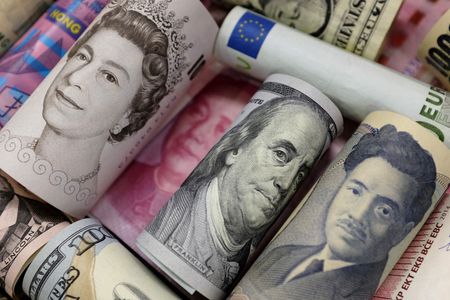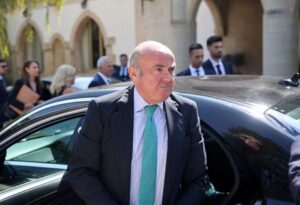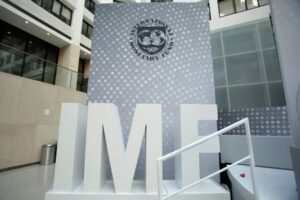By Gertrude Chavez-Dreyfuss
NEW YORK (Reuters) – Sterling fell sharply against the U.S. dollar on Friday after British Prime Minister Liz Truss fired her finance minister and scrapped parts of their economic package that has caused havoc in UK financial markets.
The dollar, on the other hand, continued its march higher against a beleaguered yen, hitting a fresh 32-year peak of 148.86. It was last up 1% at 148.67 yen. The dollar was on track to post its best weekly performance against the Japanese unit since roughly mid-August.
Traders are once again on the lookout for any potential action from Japan’s financial authorities to stem the currency’s slide. Japanese Finance Minister Shunichi Suzuki on Thursday reiterated the government’s readiness to take steps against excessive currency volatility.
Japan last month intervened to buy yen for the first time since 1998.
“Our view that intervention by the Japanese authorities to prop up the yen would stem the tide looks increasingly optimistic…we suspect they will try again soon,” said Jonathan Petersen, senior markets economist, at Capital Economics.
“Given our view that U.S. yields will fall back, we continue to think that downward pressure on the yen will abate before too long. It is one of the few major currencies that we expect to strengthen against the dollar by year-end.”
The pound, meanwhile, fell for a second straight day against the dollar, last trading at $1.1166, down 1.5%.
Kwasi Kwarteng said he had resigned at Truss’s request after being forced to rush back to London overnight from IMF meetings in Washington. He was replaced by former Foreign Secretary Jeremy Hunt.
Truss, in power for only 37 days, then told a news conference she would now allow a key business levy to rise from next year, raising 18 billion pounds, as she accepted she had gone “further and faster” than markets had been expecting.
“Over the coming days it will become more obvious whether the PM’s U-turns and the intervention by the BoE (Bank of England) have done enough to reassure investors,” said Jane Foley, head of FX strategy, at Rabobank in London.
The BoE had stepped in to buy UK gilts the last few weeks in an attempt to stabilize the bond market.
“Currently, we haven’t seen enough good news to alter our three-month forecast of $1.06 (sterling), though this assumes continued broad-based USD strength.”
The euro also rose against sterling to 86.98 pence, up 0.9%
Amid all the volatility and stress in the market, the dollar remained the safe haven. The dollar index rose 0.6% to 113.25.
U.S. retail sales were unexpectedly unchanged in September as stubbornly high inflation and rapidly rising interest rates crimp demand for goods. The unchanged reading in sales last month followed an upwardly revised 0.4% increase in August..
A survey from the University of Michigan on Friday showed consumer sentiment improved further in October, but inflation expectations deteriorated a bit as average national gasoline prices moved back up towards $4 per gallon after falling over the summer.
Both reports were consistent with expectations that the Federal Reserve will deliver another 75 basis-point interest rate increase at next month’s policy meeting.
“The question now is: Is the Fed going to go 75 (bps) again in December and the retail sales and yesterday’s CPI (consumer price index) numbers are pointing more and more toward that,” said Erik Nelson, macro strategist, at Wells Fargo Securities. “It’s reinforcing the dollar’s dominance.”
In other currencies, the euro fell 0.6% to $0.9716.
(Reporting by Gertrude Chavez-Dreyfuss; Additional reporting by Harry Robertson in London, Ankur Banerjee in Singapore, Tom Westbrook in Sydney and Kevin Buckland in Tokyo; Editing by Jacqueline Wong, Mark Potter, Tomasz Janowski and Diane Craft)





